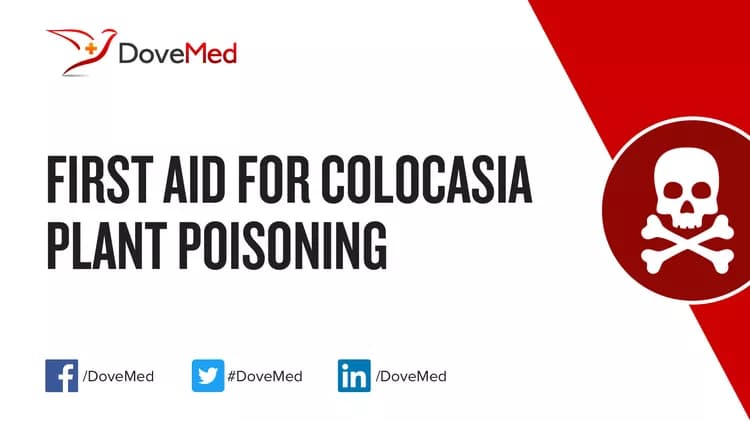What is Colocasia Plant Poisoning?
- Colocasia is a tropical large-leaved flowering plant that is native to India and parts of southeast Asia. It is cultivated for food - the roots, and sometimes, the leaves are used for preparing dishes
- Colocasia Plant Poisoning is the accidental or intentional intake of the plant or plant product containing the compound
- The condition is diagnosed based upon the clinical history, combination of signs and symptoms, and additional tests (that may include, in some cases, radiological studies and laboratory tests)
Colocasia Plant Poisoning may be also referred to variously as the following:
- Champadhumpa Poisoning
- Chembu Poisoning
- Cocoyam Poisoning
- Dasheen Poisoning
- Eddoe Poisoning
- Karkala Ko Ganu Poisoning
- Shavige Gadde Poisoning
- Taro Poisoning
- Tarul Poisoning
What are the Causes of Colocasia Plant Poisoning?
- Colocasia Plant Poisoning is caused by eating colocasia plant or plant products
- This intake could be accidental, or in some cases intentional, to bring self-harm
- The poisonous part of the plant is calcium oxalate crystals and the protein asparagine that is found in all plant parts (especially the leaves and stem). Even though it is used in cooking, the toxins may be neutralized through proper cooking
Note: The compound can interact with other prescribed or non-prescribed medications in the body. Such interactions may enhance the therapeutic effects of other medications being taken, resulting in undesired side effects.
What are the Signs and Symptoms of Colocasia Plant Poisoning?
The signs and symptoms can vary from one individual to another. It may be mild in some and severe in others. The signs and symptoms of Colocasia Plant Poisoning may include:
- Burning sensation in the mouth and throat; it may be severe, in some cases
- Swelling of the mouth and tongue; unable to speak clearly
- Formation of mouth ulcers that may affect the functions of speaking and swallowing
- Nausea, vomiting
- Diarrhea
- Contact with the eye may result in pain, redness, watery eyes, and potential damage to the cornea of the eye
How is First Aid administered for Colocasia Plant Poisoning?
First Aid tips for Colocasia Plant Poisoning:
- Call 911 or your local emergency help number immediately, for emergency assistance
- Call the Poison Control Center at 1-800-222-1222 (or your local poison control center) for further instructions
- Provide them with information such as the compound taken, quantity and time of ingestion, age, weight and general health status of affected individual
- Confirm that the airways are protected; also, ensure breathing and the presence of pulse
- Clean the mouth to remove any remaining plant pieces; wipe mouth with a wet cloth
- Unless instructed by a healthcare professional, DO NOT induce vomiting in the affected individual
- If skin exposure or involvement of the eye has occurred, then wash thoroughly with copious amounts of water (for at least 15 minutes)
- Take individual to emergency room (ER) for further treatment
- Always try to take the plant or plant product to the ER
The emergency medical health professional might perform the following steps towards treating the condition:
- Monitor vital signs
- Medically manage symptoms
- Provide breathing support, if necessary
- Wash skin and eyes repeatedly and thoroughly (irrigation), to eliminate any remaining hazardous compound
- Administer fluids by an intravenous drip line, if necessary
Who should administer First Aid for Colocasia Plant Poisoning?
First aid for Colocasia Plant Poisoning is administered by healthcare professionals.
- The individual who is affected, or someone near, should call 911 for emergency assistance (or the local emergency number)
- They should also call the poison control center at 1-800-222-1222 (or the local poison control center) and follow instructions
What is the Prognosis of Colocasia Plant Poisoning?
- The prognosis of Colocasia Plant Poisoning is dependent on the amount of substance consumed, time between consumption and treatment, severity of the symptoms, as well as general health status of the patient
- If the individual can recover from the symptoms that occur due to mild poisoning or skin contact, the outcome is generally good, with appropriate medication and early support. It may take a few days to weeks to fully recover from the incident
- In case of severe symptoms due to severe exposure/poisoning, it may prolong time of recovery. Occasionally, severe poisoning may result in obstruction of the airways, necessitating prompt medical attention
In general, toxicities are common situations in the emergency departments. A majority of the cases are often not fatal, when appropriate treatment is given.
How can Colocasia Plant Poisoning be Prevented?
Colocasia Plant Poisoning can be prevented by:
- Avoiding eating wild berries and plants, especially if you have no information about them
- Following working in the garden or fields, hiking, or camping, always wash hands thoroughly, prior to eating anything
- Being aware of basic first aid steps in case of an emergency (such as inadvertent poisoning)
What are certain Crucial Steps to be followed?
- Call 911 (or your local emergency number) for emergency assistance, if symptoms are life-threatening
- Call Poison Control Center at 1-800-222-1222 (or the local poison control center) and follow the recommend steps
- It would be helpful if the following information is readily available:
- Type, amount and time of consumption of the substance
- Age and weight of the individual
- And, the overall health status of the individual
Related Articles
Test Your Knowledge
Asked by users
Related Centers
Related Specialties
Related Physicians
Related Procedures
Related Resources
Join DoveHubs
and connect with fellow professionals


0 Comments
Please log in to post a comment.